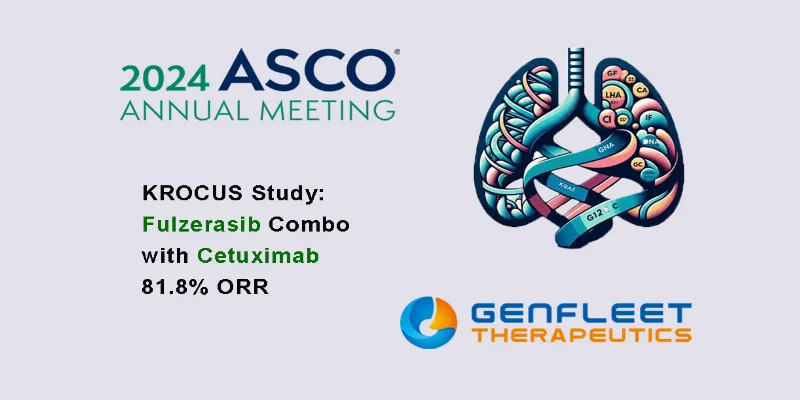GenFleet's Fulzerasib Combo Achieves High Response Rate in Lung Cancer Treatment

ONCOLife |
2 June 2024
GenFleet Therapeutics announced encouraging results from the Phase II KROCUS study at the ASCO meeting, showcasing the efficacy of combining fulzerasib with cetuximab in treating non-small cell lung cancer (NSCLC). The study highlighted an 81.8% objective response rate and a strong safety profile, marking a significant advancement in first-line treatment options for lung cancer patients with the KRAS G12C mutation.
The findings were presented at the American Society of Clinical Oncology (ASCO 2024) annual meeting, with the research accepted as a late-breaking abstract and featured in an oral presentation. This is the first time data has demonstrated the efficacy of combining a KRAS G12C inhibitor with an EGFR inhibitor in treating NSCLC at this stage.
Highly Effective Combination
Led by Dr. Rafael Rosell, the European multi-center KROCUS study began in March 2023. By April 2024, 47 patients had been enrolled, with 33 undergoing at least one post-treatment tumor evaluation. Remarkably, the objective response rate (ORR) stood at 81.8%, and the disease control rate (DCR) reached 100%. The median duration of response (DoR) was not reached yet and 88% of patients were still on treatment with a median follow-up of 5.1 months.
Dr. Rafael Rosell, the principal investigator of KROCUS study, expressed enthusiasm about the preliminary results, "I am delighted that the preliminary data of this phase II trial was selected for oral presentation at ASCO, an acknowledgement of this innovative combination therapy's potential in treating NSCLC patient in a of first-line setting. Currently, there are multiple global trials exploring the combination of KRAS G12C and EGFR inhibitors for later-line CRC. However, GenFleet is propelling the validation of this synergistic mechanism further into first-line treatment for NSCLC, the cancer type with the largest G12C-mutant patient population. We eagerly anticipate the trial's continued progress, aiming to offer more frontline options for patients worldwide."
Safety and Tolerance
The combination of fulzerasib and cetuximab not only proved effective but also demonstrated a favorable safety profile. The majority of treatment-related adverse events were mild, with severe reactions occurring less frequently than in previous studies where fulzerasib was used alone.
The data, presented by Dr. Vanesa Gregorc from Italy's Candiolo Cancer Institute, highlighted the following:
- In the first-line setting, fulzerasib in combination with cetuximab demonstrated promising efficacy (ORR was 81.8% and DCR was 100%) with a very good safety profile in advanced KRAS G12C mutated NSCLC patients.
- Fulzerasib (GFH925 or IBI351) has shown compelling efficacy in previously treated advanced KRAS G12C-mutated NSCLC in China, with an ORR of 46.6%, median DoR of 8.3 months, and median PFS of 8.3 months.
- Regarding the duration of treatment and tumor response, 88% of patients were still on treatment with a median follow-up of 5.1 months (range: 1.8 to 9.5 months).
- A Phase III trial is being planned to confirm the efficacy and safety in a larger first-line population.
Dr. Yu Wang, Chief Medical Officer of GenFleet, stated “We are excited to see that the preliminary data from our first-line combination study exceeding our expectation. Furthermore, this chemo- and immuno-free combination could potentially mitigate overlapped toxicities and delay drug resistance, leaving space to allow later-line immunotherapy to extend the patients' overall survival.”
Drug Approval and Future Research
Following these positive results, fulzerasib alone has already received a new drug application with priority review designation from China’s National Medical Products Administration (NMPA) for treating advanced KRAS G12C-mutant NSCLC. This includes breakthrough designations for treating advanced G12C-mutant NSCLC and metastatic colorectal cancer (CRC). With ongoing trials and further research, GenFleet hopes to expand frontline treatment options worldwide.
About KROCUS Study and fulzerasib (GFH925)
The KROCUS study, a global multi-center trial that began in March 2023, evaluates the safety, efficacy, and pharmacokinetic properties of fulzerasib combined with cetuximab in treating advanced NSCLC patients with KRAS G12C mutations. Fulzerasib, the first KRAS G12C inhibitor developed in China, has received NMPA Priority Review and Breakthrough Therapy Designations for treating advanced KRAS G12C-mutant NSCLC and colorectal cancer patients. The RAS protein family, which includes KRAS, is predominantly involved in many cancers. Fulzerasib targets KRAS G12C mutations, frequently found across various cancers, more than ALK, ROS1, RET, and TRK mutations combined, by specifically inhibiting a key pathway, leading to tumor cell apoptosis and cell cycle arrest.











Comments
No Comments Yet!